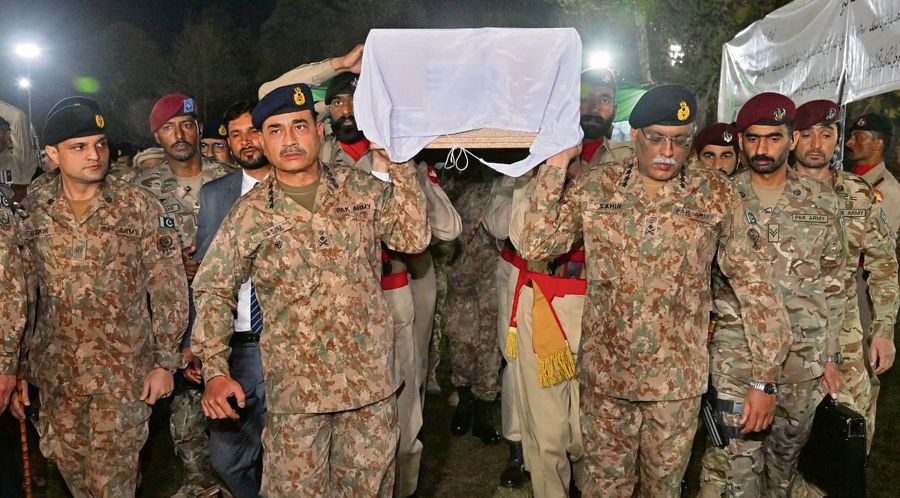
Setback: Relentless terror attacks have impacted the morale of the Pakistani security forces. Reuters
Shalini Chawla
Distinguished Fellow, Centre for Air Power Studies
PAKISTAN launched airstrikes on March 18, targeting suspected hideouts of the Tehreek-e-Taliban Pakistan (TTP) in Afghanistan’s Khost and Paktika provinces. The Afghan Taliban reportedly responded by firing on Pakistani posts along the border. The airstrikes came two days after the suicide attack on a military post in northwestern Pakistan. Terror attacks in Pakistan have risen significantly in the past year. According to the Pak Institute for Peace Studies, the country witnessed a 65 per cent increase in terrorism-related fatalities last year. A total of 306 terror attacks took place in 2023, killing 693 people, including 330 security personnel. The TTP, which has primarily targeted defence and security personnel, is the country’s most lethal militant group, posing a formidable challenge to Pakistan’s newly elected civilian leadership and the all-powerful military.
The TTP has gathered strength after the Taliban takeover of Kabul in August 2021. The group is ideologically aligned with the Taliban in Afghanistan and managed to gain tactical experience while fighting Afghan security forces alongside the Taliban during the US troop withdrawal. Reports suggest that the group has access to military equipment left behind by the Western forces in Afghanistan. The TTP draws inspiration from the Afghan Taliban and has expanded with mergers of splinter terror groups and the adoption of an aggressive social media strategy to lure disgruntled youths in tribal areas. The TTP has stood firm on its conditions of implementing Sharia in Pakistan and a demerger of tribal areas from Khyber Pakhtunkhwa province.
According to the US Department of State Report on Terrorism (2022), the “TTP draws ideological guidance” from al-Qaeda and some elements of al-Qaeda do “rely in part on TTP for safe haven in the Pashtun areas along the Afghanistan-Pakistani border”. The report highlights that this arrangement has facilitated dividends for TTP from the operational expertise of the al-Qaeda’s global terrorist network, adding to its tactical and operational capabilities.
Political uncertainty and deepening economic crisis in the past two years restricted Pakistan’s ability to act against the TTP. Then Prime Minister Imran Khan’s unsuccessful efforts to negotiate with the terror group were seen as a critical factor contributing to the TTP’s strength and inflexibility. The group has shown no inclination for negotiations after the breakdown of the ceasefire with the government in November 2022.
Pakistan holds the Afghan Taliban responsible for patronising the TTP and not exercising its leverage over the militant outfit to prevent terror attacks on Pakistani territory. The Taliban, on the other hand, have repeatedly denied supporting the TTP. Even though Islamabad hailed and cherished the victory of the Taliban in 2021, its relationship with the Afghan Taliban has not gone along the expected path. Pakistan miscalculated its ability to dictate conditions to the Taliban, who are much more assertive and have redefined their priorities as compared to the Taliban of the 1990s, who were primarily dependent on Pakistan for survival.
Till now, Islamabad had primarily exercised non-military measures to deal with the TTP, aimed at coercing the Afghan regime to act against the group: (1) Severe measures to tighten the trade regime with Kabul, including the imposition of additional fee on some imports; (2) Announcement of the repatriation of Afghan refugees residing in Pakistan; (3) Repeated warnings issued by the political and military leaders indicating serious repercussions; (4) Taking a position that Pakistan will refrain from supporting the case of recognition of the Taliban regime at the international level. These measures have added to the humanitarian crisis in Afghanistan, where 35-40 per cent of the people are experiencing acute food insecurity.
Why has Pakistan opted for military strikes against the TTP now? Simple reasoning suggests that Pakistan has had enough of the TTP’s continued attacks, which have killed a significant number of its men in uniform and civilians, and thus, punitive military action is seen as the answer. Pakistan has conducted counter-terror operations in the past — Zarb-e-Azb (2014) and Radd-ul-Fasaad (2017). During the current phase of the TTP (after 2021), Pakistan had conducted airstrikes on suspected hideouts of the militant outfit in Afghanistan in 2022. There have been critical developments in the past few months. The federal elections are over and there is relative political stability. The civilian regime under Prime Minister Shehbaz Sharif is dependent on the military for its survival. The military has clearly established its writ in the political domain by steering the dynamics in its favour after a prolonged battle against Imran’s popularity. On the economic front, Pakistan remains dependent on external assistance. The nation seems to be optimistic about commitments from its traditional donors and the military’s ability to raise foreign investments through the Special Investment Facilitation Council. Recent months have witnessed Pakistan projecting the TTP problem as a wider regional/global challenge at international forums. Now is probably an opportune time for the military to flex its muscles to counter the TTP. Relentless terror attacks have also impacted the morale of the security forces.
Although the Taliban have claimed that they retaliated to Pakistan’s airstrikes, it looks less likely that they will have the long-term ability to sustain retaliatory attacks against the Pakistan military, which is sufficiently equipped and modernised. The Pakistan-Afghanistan relations will bear the brunt of the military operations. Pakistan is likely to adopt a combination of military and non-military measures to deal with the TTP to coerce the Afghan Taliban (and target the terror group). This approach is likely to include sustained but restricted and calculated strikes across the border, strong statements at international forums highlighting the growing challenge of the TTP, seeking counter-terror assistance from major powers, and a second phase of forced repatriation of Afghan refugees.
In the past, the TTP has demonstrated resilience to sustain itself through counter-terror military operations. Will kinetic measures lead to a change in the situation for Pakistan when the TTP is hardened more than ever before? Will the volatile Afghanistan-Pakistan border attract other militant groups to expand their operations? New Delhi needs to carefully watch the developments in its neighbourhood to be able to guard against a potential spillover impact.
Join Whatsapp Channel of The Tribune for latest updates.




























